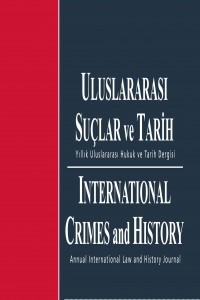
Uluslararası Suçlar ve Tarih
Yazarlar: Gülşen PAŞAYEVA, İrada BAĞİROVA, Kamal MAKİLİALİYEV, Ferhad MEHDİYEV
Konular:-
Anahtar Kelimeler:Autonomy,USSR,Azerbaijan,Armenia,Irredentism,Status,Constitution,Minority rights
Özet: The article examines the legal status of Nagorno-Karabakh’sAutonomous Oblast (NKAO) - one of the quasi-autonomous entities inthe former USSR. It begins with a brief historical background whichprovides the reasoning behind the establishment of autonomy inNagorno-Karabakh when Azerbaijan became part of the USSR.Subsequently, the authors review the level of autonomy of NKAO,focusing on the changes achieved through the consecutive USSR andAzerbaijani SSR constitutions. The research shows that the complex andentangled hierarchy of the Soviet Union governance had a formal legalstructure reflecting the strictly centralized nature of the state, and aparallel political structure in the form of the communist party and all itsbranches and bodies that exercised the actual power and decisionmaking. In this context the decentralization of power in the form ofautonomy was a myth, and the quasi-autonomy in Nagorno-Karabakhwas subject to the same system of centralized decision-making as anyother administrative unit in the Soviet Union. That said, the authorsargue that the Nagorno-Karabakh Autonomous Oblast and itspopulation received the same treatment as any other place in the USSRprecisely due to the aforementioned regime. The discrimination towardsautonomy by the authorities of Azerbaijani SSR was simply impossibledue to the centralized decision-making and bureaucratic formality fromMoscow, which precluded real legislative and administrativedecentralization of power
Dergi editörleri editör girişini kullanarak sisteme giriş yapabilirler. Editör girişi için tıklayınız.